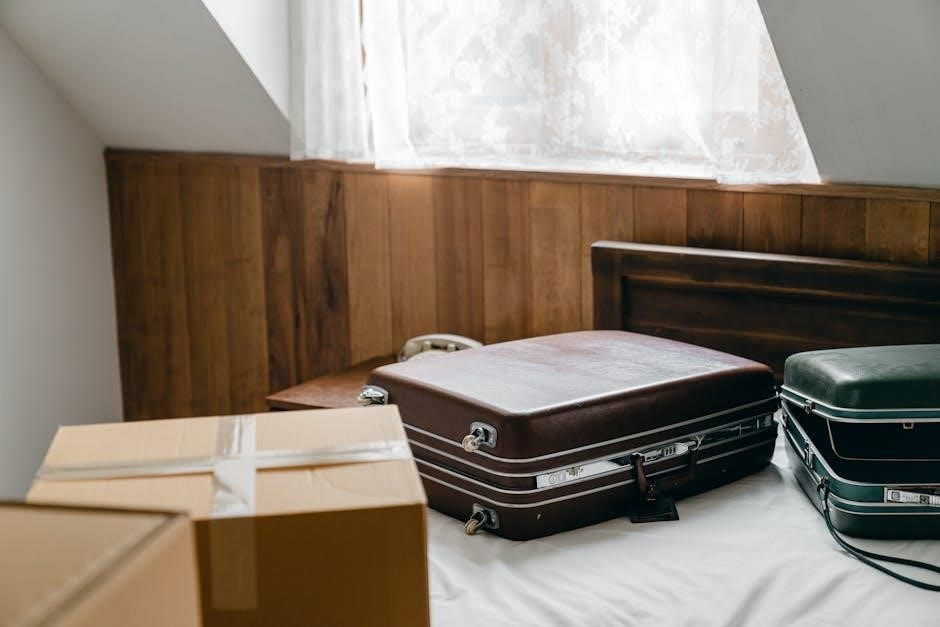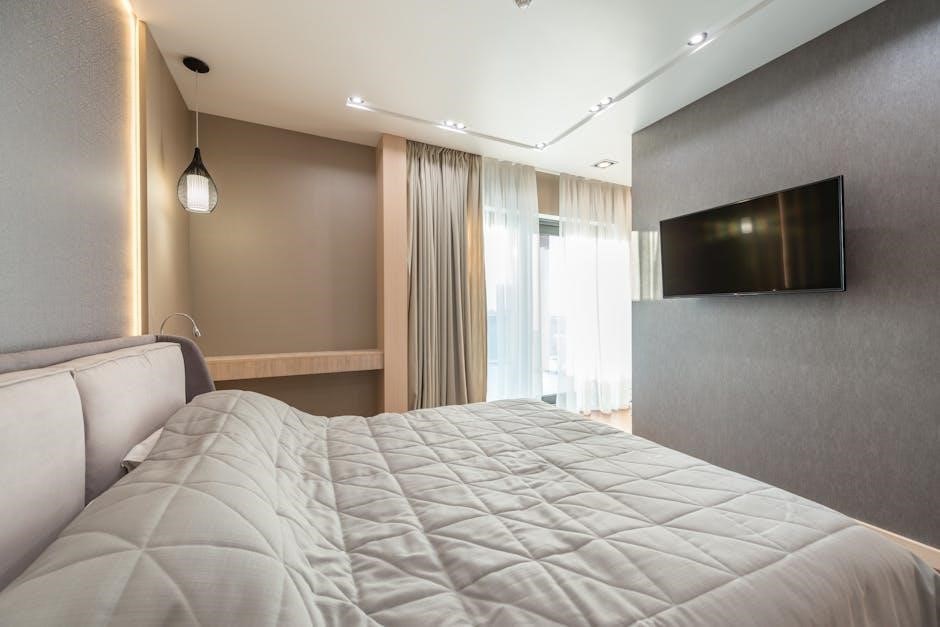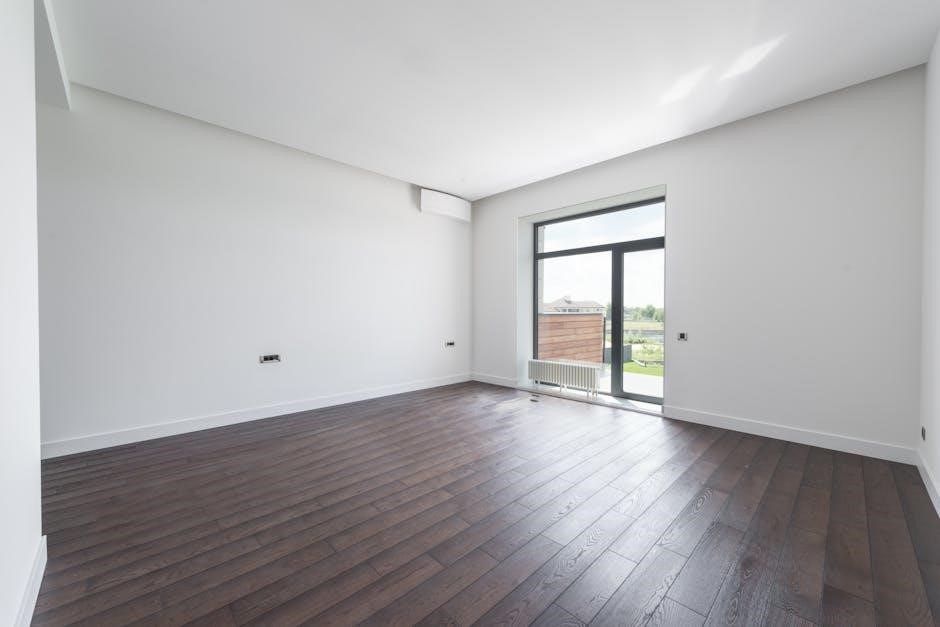house rules for tenants renting a room pdf

House rules for tenants renting a room are essential for maintaining a harmonious living environment. They outline responsibilities, rights, and expectations to ensure a smooth coexistence. These guidelines help prevent conflicts and promote mutual respect among tenants and property owners. By establishing clear expectations, house rules foster a clean, safe, and respectful space for everyone. They are a foundation for peaceful shared living and should be understood and followed by all parties involved.
1.1 Importance of House Rules
House rules are crucial for maintaining harmony and respect among tenants and property owners. They establish clear expectations for behavior, responsibilities, and shared spaces, reducing potential conflicts. By outlining guidelines, house rules protect the property, ensure cleanliness, and promote a safe environment. They also minimize liability by addressing issues like noise levels, guest policies, and maintenance. Clear rules foster accountability and mutual respect, creating a fair and organized living situation. They serve as a foundation for peaceful coexistence and are essential for upholding the rights and responsibilities of all parties involved. Implementing house rules ensures a positive and respectful living experience for everyone.
1.2 Legal Considerations
When creating house rules for tenants renting a room, it’s essential to consider legal implications. Rules must comply with local, state, and federal laws to avoid disputes. They should not violate tenant rights or fair housing laws. Landlords must ensure that rules are reasonable and non-discriminatory. For example, guest policies and noise restrictions should balance tenant privacy with property management needs. Legal consultation is recommended to verify rule enforceability. Non-compliance with laws can lead to legal challenges, fines, or eviction difficulties. Clearly outlining rules in a lease agreement helps prevent misunderstandings and ensures both parties are protected. Always review local regulations before finalizing any house rules document. This safeguards both tenants and property owners, promoting a legally sound living arrangement.

Tenant Responsibilities
Tenants are responsible for maintaining cleanliness, respecting noise levels, and properly using shared spaces to ensure a harmonious living environment. Adhering to these responsibilities fosters mutual respect and a peaceful atmosphere.
2.1 Cleanliness and Maintenance
Maintaining cleanliness is a fundamental responsibility for tenants renting a room. Tenants must keep their room and shared spaces clean and hygienic. Key responsibilities include regular trash disposal, wiping down surfaces, and reporting maintenance issues promptly. Tenants should also ensure communal areas, such as kitchens and bathrooms, are left tidy after use. Failure to maintain cleanliness can lead to deductions from the security deposit or formal warnings. Proper maintenance ensures a pleasant living environment for everyone. Tenants are also expected to address minor issues, like replacing light bulbs, to prevent larger problems. Regular inspections may be conducted to ensure compliance. Cleanliness and maintenance are essential for a harmonious and safe living space.
2.2 Noise Levels and Quiet Hours
Respecting noise levels is crucial to maintaining a peaceful living environment. Tenants must adhere to designated quiet hours, typically from 10 PM to 8 AM, to minimize disturbances. Noise restrictions apply to audio equipment, loud conversations, and foot traffic. Tenants are responsible for ensuring their guests comply with these rules. Excessive noise that disrupts other tenants may result in warnings or further action. Shared spaces, such as hallways and common areas, should also be kept quiet during these hours. Failure to abide by noise regulations can lead to formal notices or eviction. Maintaining reasonable noise levels ensures a respectful and comfortable home for everyone. Compliance is essential for harmonious cohabitation.
2.3 Shared Spaces Usage
Shared spaces, such as kitchens, bathrooms, and living areas, must be used responsibly. Tenants are expected to clean up after themselves and respect common areas. Scheduling may be required to avoid conflicts during peak times. Personal belongings should not be left in shared spaces, and tenants must ensure these areas remain tidy. Damages to shared facilities must be reported promptly. Respect for others’ privacy and property is essential. Tenants should not introduce unauthorized furniture or appliances without prior approval. Cooperation among tenants is key to maintaining a harmonious environment. Failure to adhere to shared space rules may result in corrective actions. Fair usage ensures everyone can enjoy these areas comfortably. Shared spaces are a privilege and require mutual respect and care.
Guest Policies
Guest policies are crucial for maintaining order and security. Overnight guests must be approved and are limited to a specific number of nights. Long-term guests require written consent. Tenants are responsible for their guests’ actions and must ensure they adhere to house rules. Unauthorized guests may lead to enforcement actions. Proper notification and respect for other tenants are essential. These policies help maintain a peaceful and respectful living environment for all.
3.1 Overnight Guests
Overnight guests are generally allowed but must adhere to specific house rules. Typically, only one overnight guest is permitted at a time. Guests may stay multiple times during the lease term, for up to three nights per week, or once for up to 14 consecutive nights. Tenants are responsible for their guests’ actions and must ensure they comply with all house rules. Unauthorized or excessive guest stays may lead to enforcement actions. Prior approval from the landlord or property owner is often required for extended stays. These policies help maintain order, security, and harmony among tenants. Proper notification and respect for shared spaces are essential. Guests must also follow noise and cleanliness guidelines to ensure a peaceful living environment for everyone. Failure to comply may result in penalties or lease termination. Overnight guest rules are designed to balance convenience and respect for all parties involved.
3.2 Long-Term Guests
Long-term guests are typically subject to stricter regulations to maintain order and fairness. Guests staying beyond the short-term limit (usually 14 consecutive nights) may require formal approval from the landlord. Long-term guests often need to be added to the lease agreement, ensuring they abide by all house rules. Unauthorized long-term stays can be considered a breach of contract, potentially leading to eviction. Tenants must notify the landlord in writing and obtain consent before allowing extended visits. This ensures compliance with legal and contractual obligations. Long-term guests must also contribute to utilities or additional fees if required. Proper documentation and clear communication are essential to avoid disputes. Landlords may impose limits on the duration or frequency of long-term stays to protect the interests of all parties involved. This maintains a balanced and respectful living environment.

Lease Agreement and House Rules
The lease agreement serves as the primary legal document outlining the relationship between the landlord and tenant. House rules are often incorporated into or appended to the lease agreement, making them legally binding. Tenants are expected to sign and acknowledge these rules, ensuring compliance. Key points include the tenant’s responsibilities, restrictions on guests, noise levels, and shared space usage. By signing the lease, tenants agree to adhere to both the lease terms and house rules. This integration ensures that all obligations are clear and enforceable. Any violations of the house rules may result in consequences outlined in the lease agreement, emphasizing the importance of understanding and adhering to both documents. This approach maintains order and mutual accountability in shared living environments. Landlords must ensure that house rules are fair, reasonable, and legally compliant to avoid disputes. Proper documentation and clear communication are essential for a harmonious tenancy. Tenants should carefully review all terms before signing to avoid future misunderstandings. This structured approach ensures a smooth and respectful living arrangement for all parties involved. Amendments to either the lease or house rules must be agreed upon in writing, protecting both tenant and landlord rights. This maintains a balanced and legally sound relationship throughout the tenancy period.
Renters Insurance
Renters insurance is highly recommended for tenants renting a room, as it provides protection for personal belongings and liability coverage. While not legally mandatory, landlords often request it to minimize risks. Renters insurance covers theft, damage, or loss of personal items and offers liability protection in case of accidents. This ensures tenants are safeguarded against unforeseen events. It also reduces the landlord’s liability in certain situations. Tenants should consider obtaining renters insurance to protect their interests. Discussing insurance requirements with the landlord clarifies expectations and ensures compliance with house rules. This precautionary measure benefits both parties, fostering a secure and responsible living environment. Renters insurance is a prudent choice for tenants to safeguard their assets and peace of mind.
Compliance with Local Laws
Compliance with local laws is essential for tenants renting a room. House rules must align with regional regulations, ensuring legal standards are met. Tenants should familiarize themselves with local ordinances, such as health codes, noise restrictions, and waste management guidelines. Landlords are also responsible for adhering to housing laws, including safety standards and fair tenant treatment; Non-compliance can result in legal consequences, such as fines or eviction. Tenants and landlords must work together to ensure all actions are lawful. This mutual effort fosters a respectful and legally sound living environment. By understanding and following local laws, tenants can avoid conflicts and maintain a harmonious rental experience. Compliance is a shared responsibility for a smooth tenancy. Local laws provide a framework for fair and safe living conditions, benefiting both parties.

Enforcement of House Rules
Enforcing house rules is crucial for maintaining order and respect within the rental property. Landlords should clearly communicate the consequences of violating rules to tenants. Regular inspections and open communication can help monitor compliance. If a tenant fails to adhere to the rules, landlords may issue warnings or impose penalties, as outlined in the agreement. Non-compliance that persists may lead to more severe actions, such as eviction. Tenants are also encouraged to report violations to the landlord to uphold the rules. Enforcement ensures a fair and respectful environment for all tenants and protects the property from potential damage or disputes. Consistent enforcement fosters accountability and maintains the integrity of the house rules.
Amendment Procedure
Amending house rules requires a structured approach to ensure fairness and transparency. Landlords must propose changes in writing, providing tenants with a reasonable review period. Tenants should have the opportunity to discuss and agree on amendments. Once mutually agreed, the updated rules are documented and signed by all parties. Changes become effective either on the date specified in the amendment or within 30 days of notification, whichever is later. This process ensures that house rules remain relevant and enforceable, adapting to the needs of the household while respecting the rights of all tenants. Proper documentation and communication are key to maintaining trust and compliance.

Termination for Non-Compliance
Non-compliance with house rules can lead to termination of the tenancy. Landlords must follow legal procedures to evict tenants who repeatedly violate agreed-upon rules. Tenants are typically given a written warning detailing the breach and the required corrective action. If the issue persists, the landlord may serve a formal eviction notice. This process ensures fairness and adherence to local landlord-tenant laws. Tenants are encouraged to address concerns promptly to avoid termination. Proper documentation of violations is essential for legal proceedings. Both parties should be aware of their rights and obligations to prevent disputes. Termination is a last resort, aimed at maintaining a orderly and respectful living environment.
Finding the Right House Rules Document
Finding the right house rules document is crucial for ensuring clarity and fairness. Landlords and tenants can benefit from using templates or sample documents available online. These templates often cover key areas such as cleanliness, noise levels, guest policies, and shared space usage. Customizing the document to suit specific needs ensures it aligns with the property’s unique requirements. Legal websites and rental resources provide comprehensive guides to help draft enforceable house rules. By using a well-structured document, both parties can avoid disputes and maintain a harmonious living environment. Regularly reviewing and updating the document ensures it remains relevant and effective. A clear, detailed house rules document fosters mutual understanding and respect among all parties involved.